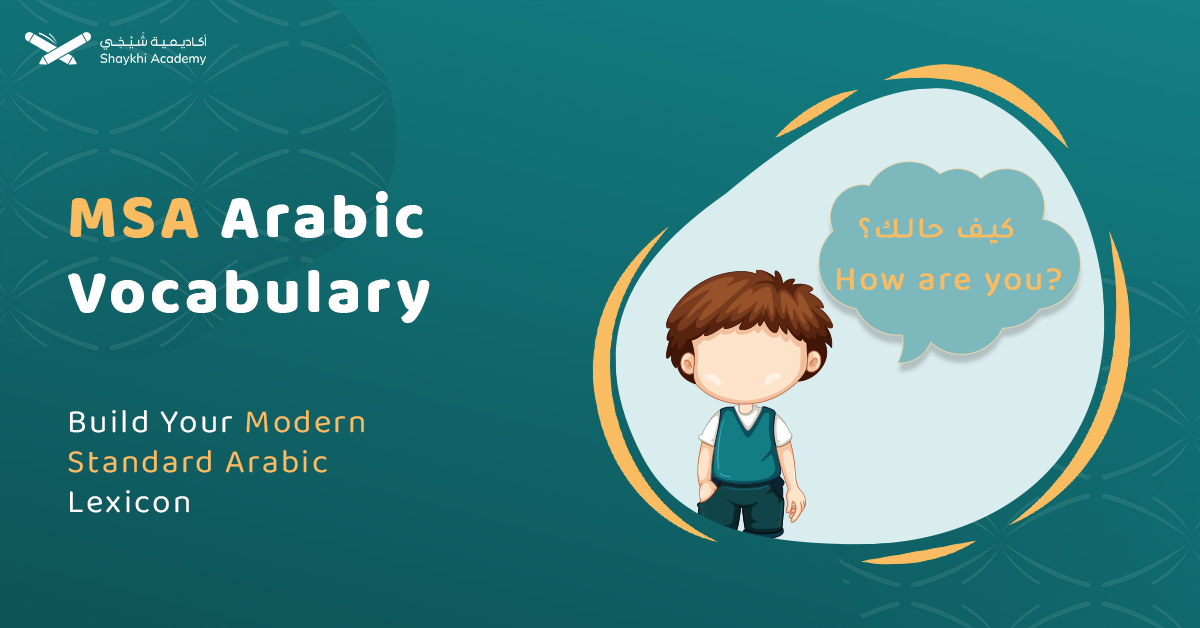Classical Arabic and Modern Standard Arabic (MSA) are two distinct yet interconnected forms of the Arabic language, each holding significance in different contexts. While MSA is used widely in formal settings like news, media, and education, Classical Arabic is deeply embedded in religious, literary, and historical texts.
In this exploration, we delve into the rich vocabulary of both Classical Arabic and MSA, showcasing 30 carefully selected words from each form, complete with their pronunciation, meanings, and example sentences.
These vocabularies reflect not only the linguistic beauty but also the cultural and spiritual depth of the Arabic language across time.
MSA Arabic Vocabulary:
Learning common MSA Arabic vocabulary will help you in having effective communication with Arabs from different regions, as learning vocabulary is essential to developing your Arabic oral linguistic skills.
In the following table is a collection of common MSA Arabic vocabulary along with practical example sentences:
| # | Arabic Word | English Meaning | Pronunciation | Example Sentence in Arabic |
| 1 | كتاب | Book | Kitāb | قرأتُ كتابًا جديدًا. (I read a new book.) |
| 2 | مدرسة | School | Madrasah | ذهبتُ إلى المدرسة اليوم. (I went to school today.) |
| 3 | سيارة | Car | Sayyārah | اشتريتُ سيارة جديدة. (I bought a new car.) |
| 4 | مكتب | Office | Maktab | يعملُ أبي في مكتب كبير. (My father works in a big office.) |
| 5 | بيت | House | Bayt | هذا بيتي. (This is my house.) |
| 6 | هاتف | Phone | Hātif | اتصلتُ بك عبر الهاتف. (I called you on the phone.) |
| 7 | طاولة | Table | Tāwilah | وضعتُ الكتاب على الطاولة. (I placed the book on the table.) |
| 8 | كرسي | Chair | Kursī | جلستُ على الكرسي. (I sat on the chair.) |
| 9 | باب | Door | Bāb | أغلق الباب من فضلك. (Close the door, please.) |
| 10 | نافذة | Window | Nāfidhah | فتحتُ النافذة للتهوية. (I opened the window for ventilation.) |
| 11 | ماء | Water | Mā’ | شربتُ كأسًا من الماء. (I drank a glass of water.) |
| 12 | طعام | Food | Ta’ām | أكلتُ طعامًا لذيذًا. (I ate delicious food.) |
| 13 | قهوة | Coffee | Qahwah | أحب شرب القهوة. (I like drinking coffee.) |
| 14 | ساعة | Clock/Hour | Sā’ah | الساعة الآن الثالثة. (It is now three o’clock.) |
| 15 | قلم | Pen | Qalam | كتبتُ الرسالة بالقلم. (I wrote the letter with a pen.) |
| 16 | حقيبة | Bag | Haqībah | وضعتُ الكتب في الحقيبة. (I put the books in the bag.) |
| 17 | حاسوب | Computer | Hāsūb | استخدمُ الحاسوب في العمل. (I use the computer at work.) |
| 18 | كتابة | Writing | Kitābah | أحب الكتابة في وقت الفراغ. (I enjoy writing in my free time.) |
| 19 | سيارة أجرة | Taxi | Sayyārat ‘Ajrah | استأجرتُ سيارة أجرة. (I hired a taxi.) |
| 20 | شباك | Ticket Window | Shubbāk | اشتريت التذكرة من الشباك. (I bought the ticket from the window.) |
| 21 | شارع | Street | Shāri’ | مشيت في الشارع الرئيسي. (I walked on the main street.) |
| 22 | كتاب إلكتروني | E-book | Kitāb Iktirūnī | قرأت كتابًا إلكترونيًا. (I read an e-book.) |
| 23 | بريد | Barīd | أرسلتُ رسالة بالبريد. (I sent a letter by mail.) | |
| 24 | جريدة | Newspaper | Jarīdah | قرأتُ الأخبار في الجريدة. (I read the news in the newspaper.) |
| 25 | مقهى | Café | Maqhā | جلسنا في المقهى لشرب القهوة. (We sat at the café to drink coffee.) |
| 26 | مطار | Airport | Maṭār | وصلت إلى المطار في الوقت المناسب. (I arrived at the airport on time.) |
| 27 | سفر | Travel | Safar | أحب السفر إلى البلدان الجديدة. (I love traveling to new countries.) |
| 28 | جواز سفر | Passport | Jawāz Safar | نسيتُ جواز السفر في المنزل. (I forgot my passport at home.) |
| 29 | لغة | Language | Lughah | أتعلم اللغة العربية. (I am learning the Arabic language.) |
| 30 | جامعة | University | Jāmi’ah | التحقتُ بالجامعة هذا العام. (I joined the university this year.) |
Classical Arabic Vocabulary:
Classical Arabic vocabulary is a more formal version of the Arabic language, usually found in religious and literary texts that revolve around Islam or the history of Arabs. Islamic studies learners would need to join a Classical Arabic course to pick up some of the common words and enhance their comprehension of the different texts.
| # | Arabic Word | English Meaning | Pronunciation | Example Sentence in Arabic |
| 1 | كتاب | Book | Kitāb | قال الله تعالى في كتابه. (Allah said in His Book.) |
| 2 | مسجد | Mosque | Masjid | ذهبتُ إلى المسجد للصلاة. (I went to the mosque for prayer.) |
| 3 | يوم | Day | Yawm | يوم القيامة يومٌ عظيم. (The Day of Judgment is a great day.) |
| 4 | نبي | Prophet | Nabī | محمد نبي الله. (Muhammad is the Prophet of Allah.) |
| 5 | دين | Religion | Dīn | الإسلام دين الحق. (Islam is the true religion.) |
| 6 | صلاة | Prayer | Ṣalāh | أقم الصلاة لدلوك الشمس. (Establish prayer at sunset.) |
| 7 | علم | Knowledge | ‘Ilm | طلب العلم فريضة. (Seeking knowledge is an obligation.) |
| 8 | رحمة | Mercy | Raḥmah | الله واسع الرحمة. (Allah is vast in mercy.) |
| 9 | صدق | Truthfulness | Ṣidq | الصدق يهدي إلى البر. (Truthfulness leads to righteousness.) |
| 10 | حكمة | Wisdom | Ḥikmah | ومن يؤتَ الحكمة فقد أُوتي خيرًا كثيرًا. (And whoever is given wisdom has been given much good.) |
| 11 | صبر | Patience | Ṣabr | واصبرْ على ما أصابك. (Be patient with what befalls you.) |
| 12 | قلب | Heart | Qalb | في قلوبهم مرض. (In their hearts is disease.) |
| 13 | نفس | Soul/Self | Nafs | كلُّ نفسٍ ذائقةُ الموت. (Every soul shall taste death.) |
| 14 | علم | Science/Knowledge | ‘Ilm | إنما العلم عند الله. (Knowledge is only with Allah.) |
| 15 | رزق | Sustenance | Rizq | إنَّ الله هو الرزاق. (Indeed, Allah is the Provider.) |
| 16 | سيف | Sword | Sayf | كان السيف رمزًا للشجاعة. (The sword was a symbol of bravery.) |
| 17 | عدل | Justice | ‘Adl | إن الله يأمر بالعدل. (Indeed, Allah commands justice.) |
| 18 | حق | Truth | Ḥaqq | الحقُّ أبلجُ. (The truth is clear.) |
| 19 | فضل | Grace | Faḍl | ذُو فضلٍ عظيم. (Of great grace.) |
| 20 | نور | Light | Nūr | الله نور السموات والأرض. (Allah is the Light of the heavens and the earth.) |
| 21 | جنة | Paradise | Jannah | وعد الله المؤمنين بالجنة. (Allah promised the believers Paradise.) |
| 22 | نار | Fire (Hellfire) | Nār | النار مأوى الكافرين. (The fire is the dwelling of the disbelievers.) |
| 23 | عقل | Intellect/Mind | ‘Aql | العقل نعمة من الله. (The intellect is a blessing from Allah.) |
| 24 | خلق | Creation | Khalq | خلق الله السماوات والأرض. (Allah created the heavens and the earth.) |
| 25 | صراط | Path | Ṣirāṭ | اهدنا الصراط المستقيم. (Guide us to the straight path.) |
| 26 | أمر | Command | Amr | إنَّ أمر الله نافذ. (Indeed, the command of Allah is executed.) |
| 27 | كتاب | Scripture | Kitāb | القرآن كتاب الله. (The Quran is the Book of Allah.) |
| 28 | سمع | Hearing | Sam‘ | إن الله سميعٌ بصير. (Indeed, Allah is All-Hearing, All-Seeing.) |
| 29 | هدى | Guidance | Hudā | الهداية من الله. (Guidance is from Allah.) |
| 30 | شكر | Gratitude | Shukr | إنَّ الله يحب الشاكرين. (Indeed, Allah loves the grateful.) |
Join the Comprehensive and Interactive Classical Arabic Course at Shaykhi Academy
Unlock the beauty and eloquence of the Arabic language by enrolling in the Arabic Fusha course at Shaykhi Academy. Whether you’re a beginner or looking to refine your skills, this course offers a structured approach to mastering Fusha, the formal version of Arabic used in media, literature, and formal communication across the Arab world.
With expert instructors and interactive lessons, you’ll build confidence in speaking, reading, and understanding Arabic. Don’t miss this opportunity to connect with a rich linguistic and cultural heritage—join today and start your journey to fluency!
Why Shaykhi Academy?
- Expert Native Tutors: Learn from highly qualified native Arabic speakers.
- Flexible Scheduling: Tailor your classes to fit your busy life.
- Affordable Learning: Access top-quality education at a price that suits you.
- Global Access: Study from anywhere in the world.
Explore Our Arabic Courses:
- Noorani Qaida: Build a strong foundation in Quranic Arabic.
- Comprehensive Arabic Courses: Master the Arabic language, from beginner to advanced levels.
- Fusha Arabic Classes: Delve into Modern Standard Arabic, the key to understanding literature, media, and formal communication across the Arab world.
- Quranic Arabic Course: Enhance your connection with the Quran by learning the language in which it was revealed.
Start Your Arabic Journey Today! Whether you’re just starting or looking to deepen your knowledge, Shaykhi Academy is here to support your journey. Book your free trial now and begin your path to Arabic mastery!

The Conclusion:
The comparative vocabulary lists of Classical Arabic and MSA highlight the subtle yet meaningful distinctions between the two forms of the language. While MSA serves the needs of modern communication and education, Classical Arabic remains timeless, preserving the eloquence and sacredness of religious texts.
Both forms contribute uniquely to the rich tapestry of Arabic, enabling learners to appreciate the language’s depth and versatility. By familiarizing ourselves with these words, we take a step closer to understanding the linguistic heritage that continues to shape Arab culture and the global influence of Arabic.

















































